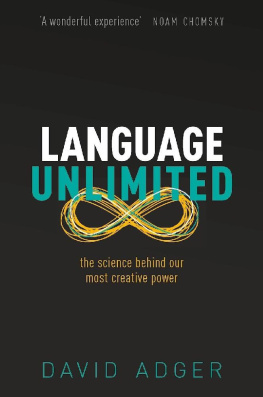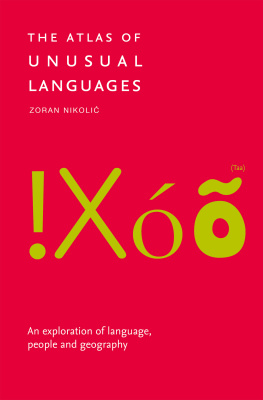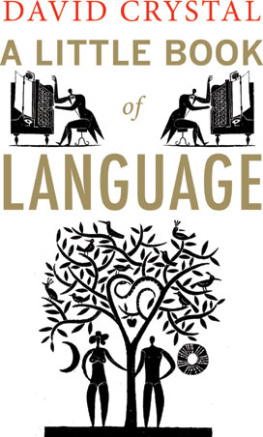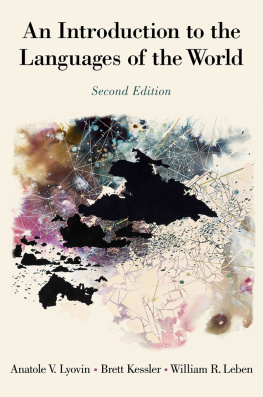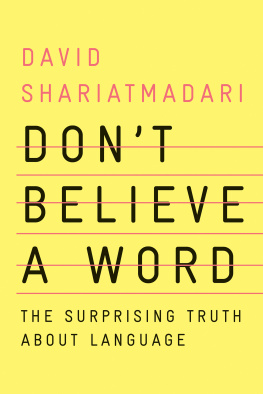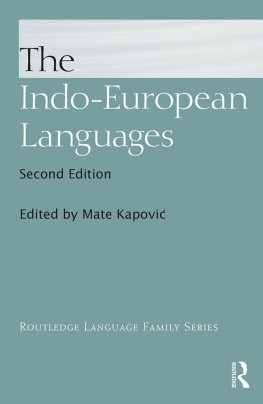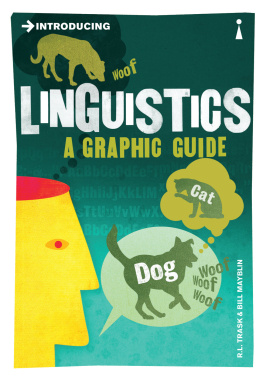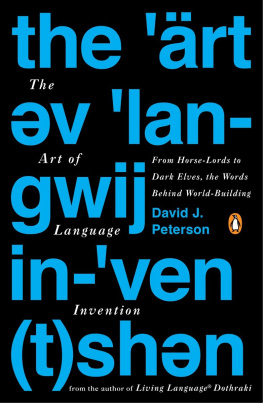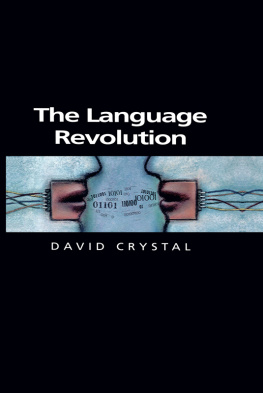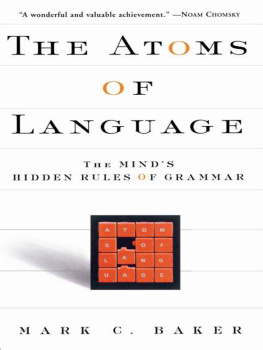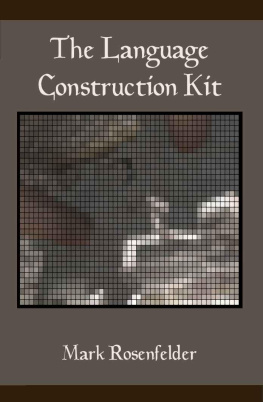Oxford University Press is a department of the University of Oxford.
It furthers the Universitys objective of excellence in research, scholarship,
and education by publishing worldwide. Oxford is a registered trade mark of
Oxford University Press in the UK and in certain other countries
All rights reserved. No part of this publication may be reproduced, stored in
a retrieval system, or transmitted, in any form or by any means, without the
prior permission in writing of Oxford University Press, or as expressly permitted
by law, by licence or under terms agreed with the appropriate reprographics
rights organization. Enquiries concerning reproduction outside the scope of the
above should be sent to the Rights Department, Oxford University Press, at the
address above
My fascination for language appeared when I was about ten years old. Id been reading Ursula Le Guins A Wizard ofEarthsea, still one of my favourite books. In it, our hero Ged, is sent to a windy isolated tower on Roke, an island in the centre of Le Guins world of Earthsea. The tower is the home of the Master Namer, Kurremkarmerruk, who teaches the core of the magical system of Earthsea: the true names of things. There, Ged learns name after name. Each plant and all its leaves, sepals, and stamens, each animal, and all their scales, feathers, and fangs. Kurremkarmerruk teaches his students that to work magic on something, you need to know the name of not just that thing, but all of its parts and their parts. To enchant the sea, Ged needed to know not just the name of the sea, but also the names of each gully and inlet, each reef and trench, each whirlpool, channel, shallows, and swell, down to the name of the foam that appears momentarily on a wave.
I found this thought fascinating even at the age of ten. I didnt really understand it, because it is paradoxical. How infinitesimal do you need to go before there are no more names? How particular do you need to be? A wave on the sea appears once, for a moment in time, and the foam on that wave is unique and fleeting. No language could have all the words to name every iota of existence. How could a language capture the numberless things and unending possibilities of the world?
I was captivated by this question. And I still am. For although Le Guins Language of Making is mythical, human language does, in fact, have this almost mystical power. It can describe the infinite particularity of the world as we perceive it. Language doesnt do this through words, giving a unique name to each individual thing. It does it through sentences, through the power to combine words, what linguists call syntax. Syntax is where the magic happens. It takes the words we use to slice up our reality, and puts them together in infinitely varied ways. It allows me to talk about the foam I saw on a wave, the first one that tickled my bare toes on a beach in Wemyss, in Fife, on my tenth birthday. It gave Le Guin the power to put Kurremkarmerruks Isolate Tower into the minds eye of that same ten year old. It both captures the world as it is, and gives us the power to create new worlds.
In this book, I explain how syntax gives language its infinitely creative power. The book is a dip into the sea of the syntax of human language. It is no more than a skimming of the foam on a single wave, but I hope it gives an idea of how important understanding syntax is to the broader project of understanding human language.
David Adger
London
October 2018
I want to begin this book by asking you to make up a sentence. It should be more than a few words long. Make one up that, say, spans at least one line on the page. Now go to your favourite search engine and put in the sentence youve made up, in inverted commas, so that the search engine looks for an exact match. Now hit return.
Question: does your sentence exist anywhere else on the internet? Ive tried this many times and each time, the answer is no. Im guessing that that was your experience too. This isnt just a side effect of using the internet either. The British National Corpus is an online collection of texts, some from newspapers, some that have been transcribed from real conversations between people speaking English. There are over 100 million words in this collection. I took the following sentence from the corpus at random, and searched for it again, to see if it appeared elsewhere in the millions of sentences in the corpus. I then did the same on Google.
Its amazing how many people leave out one or more of those essential details.
There are no other examples. It seems crazy, but sentences almost never reoccur.
Think about your sense of familiarity with the sentences you hear or say. None of the sentences Ive written so far feel new or strange. You arent surprised when you read them. You just accept them and get on with it.
This is, if you think about it, quite remarkable. These sentences are new to you, in fact perhaps new to the human race. But they dont seem new.
The fact that sentences hardly reoccur shows us that we use our language in an incredibly rich, flexible, and creative way, while barely noticing that we are doing this. Virtually every sentence we utter is novel. New to ourselves, and, quite often, new to humanity. We come up with phrases and sentences as we need to, and we make them express what we need to express. We do this with incredible ease. We dont think about it, we just do it. We create language throughout our lives, and respond creatively to the language of others.
How can we do this? How can humans, who are finite creatures, with finite experiences, use language over such an apparently limitless range?
This book is an answer to that question. It is an explanation of what it is about human language that allows us to create sentences as we need them, and understand sentences weve never heard before.
The answer has three parts.
The first is that human languages are organized in a special way. This organization is unique, as far as we know, to humans. Sentences look as though they consist of words in a sequence, but that is not how the human mind understands them. We sense, instead, a structure in every sentence of every language. We cannot consciously perceive this structure, but it contours and limits everything we say, and much of what we think. Our sense of linguistic structure, like our other senses, channels particular aspects of our linguistic experience into our minds.

